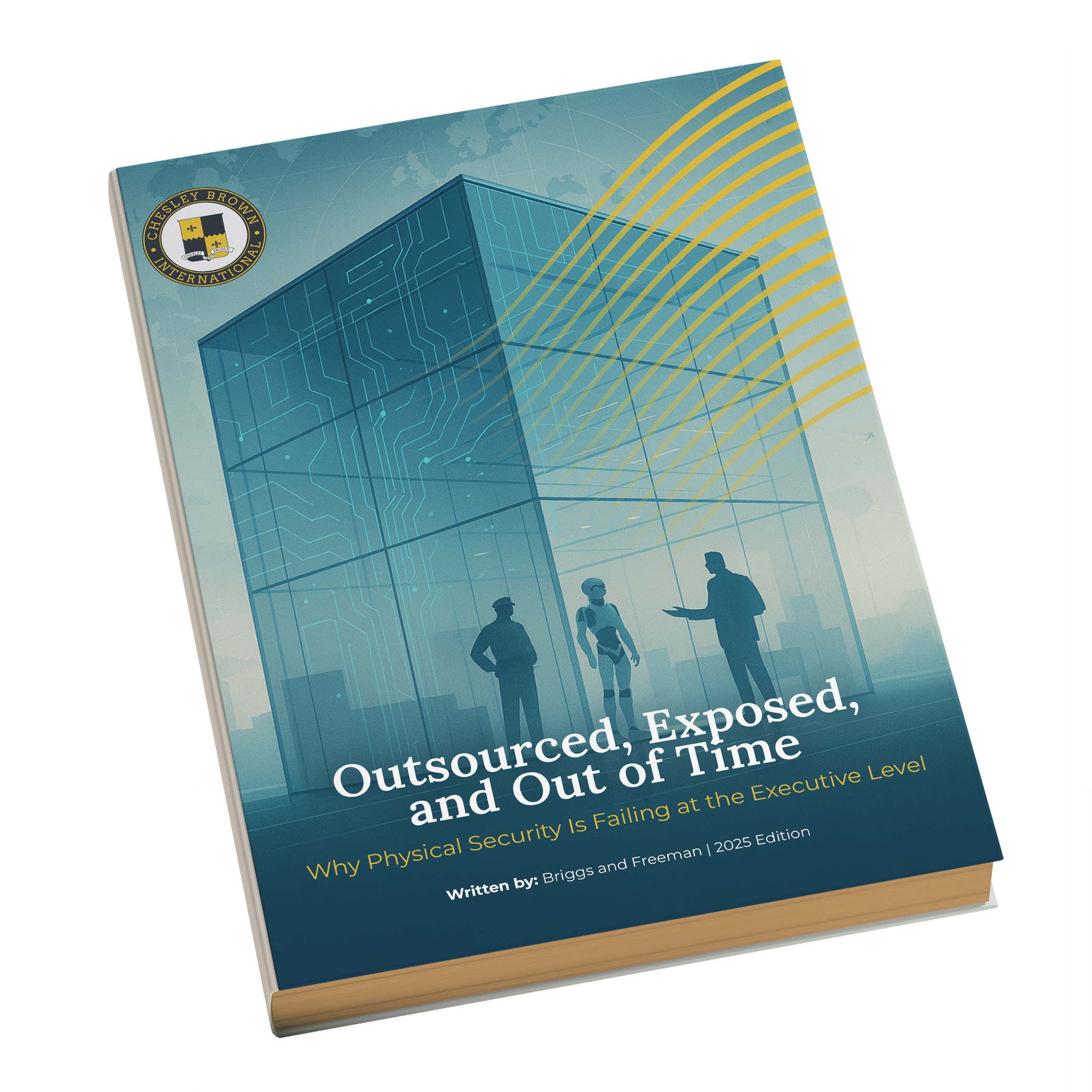By: James Hart
Recent years have provided almost constant reminders about the importance of supply chains — and just how fragile they can be. Pandemics, shutdowns and natural disasters have all interrupted the orderly flow of goods to the marketplace.
Some of the biggest and most expensive disruptions have been caused by thieves, hackers, rivals and even state actors.
“To ensure their long-term success, companies must secure their supply chains,” said Brent Brown, the chairman and CEO of Chesley Brown International, the security consulting and management firm. “Otherwise, they endanger their revenue, intellectual property, customers and reputations.”
Supply chain security can be challenging, though. The risk isn’t contained to one business with one facility or one network at risk. Instead, dozens or hundreds of organizations could be involved. It’s not just a single company and its direct vendors. It’s the vendors’ vendors. And those companies’ vendors, all the way down the line.
“It’s not like securing a building where we can go in and say, OK, we know we have a structure,” Brown said. “We know we can start with the outside perimeter and start moving in and do it at levels. Supply chain is entirely different.”
With careful planning, companies can account for all those variables and harden their systems against the people who mean them harm.
Find the weak links in your supply chain
The first step is to conduct a security assessment that identifies every piece of the supply chain, how they interact and what their potential weaknesses are.
“I see things visually,” Brown said. “So if I’m going to evaluate the supply chain, I’m going to write out and make an actual chain and look for where my weakest link is.”
Cybersecurity
For many companies, cybersecurity is their weak spot. If they don’t have strong defenses and active monitoring — and if they aren’t staying current with the latest technology and threats — hackers could steal confidential information like customer lists, business plans or closely guarded processes and formulas. Other cybercriminals focus on sabotage. They try to wreck critical systems and damage expensive equipment.
Some of the most common, most damaging attacks involve the exposure of customers’ information. Customers are put at risk. And the company itself faces massive financial and reputational costs, including the potential for a class-action lawsuit.
“It can be devastating if someone grabs information on your clients and exposes it, whether your company deals with 10 high-end clients or 100,000,” Brown said.
Security breakdowns directly impact the bottom line. According to IBM, the average cost of a data breach was about $4.88 million globally in 2024 — a 10% increase over the previous year.
Physical security
“While cyber is important, companies can’t overlook physical security,” Brown said. “Sometimes a security breach is as simple as someone stealing a truck loaded with inventory.”
Companies can significantly increase their level of protection just by using proven solutions — for example, installing surveillance cameras, placing tracking devices in vehicles and controlling access to buildings and parking lots.
The trick is identifying problems not just in your facilities, which you control, but in your partners, too, and the handoffs between each link in the supply chain.
Businesses should keep an eye on details and deviations that might not be obvious.
“Was that shipment two days late because the vendor’s truck was late, or was it late because they were compromised and they’re trying to contain it?” Brown said. “Smart companies monitor every single aspect of their supply chain.”
And that monitoring should be consistent.
“Once you set up the security for your supply chain, it has to be monitored,” Brown said. “It has to be constant, and it has to be a living document.
“You’re always reevaluating. And then when something hits, whether it’s minor or catastrophic, as security experts, we have to go back and say, all right, how did we miss that? And how do we address that particular problem?”
Getting another perspective
Unfortunately, there are so many ways that someone with ill intent can attack a supply chain. Some threats are clear, but others are “unknown unknowns.” It’s hard to plan for those dangers because companies don’t know what they don’t know.
Hiring a professional security firm can identify places where a supply chain might be attacked. Its recommendations are based on its team members’ years of professional experience in preventing and investigating security breaches. Simply getting an informed outside view can uncover problems that might be overlooked by internal teams.
Brown recommends getting specific when hiring consultants. Ask them exactly what they have done in the field. After all, anybody can call themselves an expert in supply chain security.
Work with vendors to fix security weaknesses
Organizations shouldn’t be shy about pushing vendors to tighten their security. A company can implement comprehensive protections inside its own facilities and systems, but it could still suffer intrusions because of its vendors.
“Let’s say we’ve done an analysis on our supply chain, and we’re good, we’re solid,” Brown said. “What about the three vendors that supply this part and that part and this part?”
Many vendors are smaller companies. They might have made the same widget for decades, but they haven’t stayed current with firewalls or access control to their buildings. As a result, they’re at a higher risk of theft and breaches.
“If you have a vendor that has no capability of understanding the importance of security, guess what?” Brown said. “You have to involve yourself and fix it because that’s your problem, too.”
Companies should conduct joint security tests with their vendors. Hire experts to assess their physical and digital security. A penetration test — where consultants do their best to breach security like an intruder would — can reveal overlooked problems.
Brown also recommends holding tabletop exercises where a company and its vendors confront a theoretical breach.
“We sit down as a security team, and we literally go around the table,” he said. “Here’s the scenario. What are you going to do if this happens, and what’s your responsibility? And we critique the responses.
“That’s where you start asking, ‘Where are the weak links, and how are we going to fix them?’”
Most vendors will work with their customers, and fortunately, most security fixes aren’t that complicated. Some can’t or won’t cooperate, though.
“The reality is that, if they’re not going to buy in, or if they’re just not going to participate in the fix, then you need to look for another vendor,” Brown said.
It pays to have good working relationships with vendors so they will proactively communicate about problems.
“They’re the ones that call you up and say, listen, we screwed up or something totally out of our control happened, and it’s going to affect you,” Brown said.
Create a crisis plan for security breaches
Brown recommends creating a crisis plan for responding to supply chain security breaches, the way a company prepares for a fire or a natural disaster.
He gives a hypothetical. What if a hacker infiltrates the network of a food-processing plant? Instead of stealing critical information, though, the hacker gets into the facility’s climate controls. That intruder could raise the temperature in the freezers for several hours and then return it to normal without anyone noticing.
Nobody knows the food has gone bad — until customers start eating it and getting sick. That breach could have a massive impact, affecting thousands or even millions of people.
A company needs to respond quickly when something like that happens, especially in industries like food or pharmaceuticals. They need to investigate how it happened and implement new safeguards while alerting the general public and other stakeholders.
Having a ready-to-go plan makes that much easier. And if a company handles the recovery well, it could help restore some of the trust lost because of a security breach.
Key takeaways
To protect their supply chains, companies must understand how every link connects to the others — and where criminals, rivals and foreign governments could disrupt operations.
A complete security assessment is the perfect starting point. The assessment should look at the supply chain’s operations in the online and physical worlds.
Because there are so many potential threats, work with a professional security firm. Their outside perspective could help uncover hidden dangers.
Chesley Brown draws on decades of expertise to assist organizations across the country with supply chain security. Not only can the firm put a trained, vetted security detail to work in your facilities every day, it offers a comprehensive suite of services in cybersecurity, corporate investigations, emergency planning and more.
Contact Chesley Brown today for a free consultation.
Sign up!
For industry-leading guides and analysis sign up for our blog below.
Latest News
From Headlines to Early Warnings: How Real-Time Intelligence Shields Organizations From Tomorrow’s Crises
At 8:11 a.m., the regional COO’s phone lit up with a text from a site manager: “There’s a crowd forming outside the Atlanta distribution center – looks like a protest.” By the time the security…
The IoT Security Nightmare: Why Smart Buildings Are a Hacker’s Playground
Picture the Scene On a Tuesday morning in downtown Chicago, tenants in a new office tower swipe their badges at the glass entrance doors. Inside, the lobby lighting adjusts automatically to the growing crowd. Elevators,…
Why Rooftop Access Control Should Be Standard Practice at Outdoor Events
Lessons Unlearned, Countermeasures Unmeasured Written By: Max Briggs, Vice President, Chesley Brown International The first rule of open-air event security sounds simple: control what you can see, and see what you can’t control. In practice,…
White-Collar Crime: How to Detect and Prevent Fraud in Your Business
Fraud rarely announces itself with flashing lights. It works quietly, exploiting gaps in oversight, trust, and accountability until the numbers no longer add up. In 2023, a regional finance firm learned this lesson the hard…
From Ports to Warehouses: Securing the Supply Chain in 2025
Summary: The Human Side of a Global Problem It started with a call just before sunrise. A regional operations manager learned a high-value shipment never made it from the port to the warehouse. The truck…







